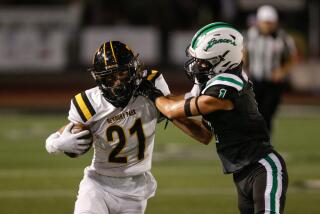They’re Roughing It
- Share via
One difference between being the best rugby club team in America and, say, the best basketball team in the land is the size of your traveling party.
Excluding the players, coaches and team officials venturing to Hartford, Conn., for Saturday’s Rugby Super League championship final, Belmont Shore Rugby Club is sending east a party of friends, family, fans and well-wishers totaling five.
“And one of them is Mrs. Jane Webber,” Belmont Shore Rugby Club chairman Doug Pye said, referring to the wife of the team’s coach, Matt Webber. “She’s come up all the way from New Zealand for the final. She claims she’s our good luck charm. She’s been at the last two, and we’ve won both of those.”
A five-person traveling party. Shaquille O’Neal’s personal entourage is bigger than that.
“We’re not arguing about that,” Pye said with a laugh. “We’ll take whatever we can get.”
Another difference is training facilities. Belmont Shore is a veritable rugby dynasty, playing in its sixth Super League final in the league’s eight-year existence, bidding this weekend for a three-peat against East Conference champion New York Athletic Club. Yet it is something of a nomad when it comes to practice sites. Usually, the team trains at St. Anthony High’s football field in Lakewood. Occasionally, it works out on an abandoned soccer field at Long Beach State.
And those are major improvements over some of the pitches and patches the club has had to scrounge up over the years.
Sitting on metal bleacher seats at Long Beach State earlier this week, Pye and Webber chuckled as they reminisced about some of the indignities their team has endured.
“We have had some absolutely shocking bits of dirt to train on,” Pye said. “Stones and glass and no grass.... The worst was Veterans Park [in Long Beach]. Total quarry.”
Webber: “Dirt farm.”
Pye: “And then the sprinklers go off and you’re left with a combination of mud and pebbles. That’s when an amateur aspect of rugby really manifests itself here.”
Belmont Shore dominates the highest level of club rugby in the United States, which is to say it is the best amateur team in the country. There is no professional rugby league in the United States. The Super League was formed in 1998 to at least lend some professional organization to the nation’s top amateur rugby teams.
Belmont Shore, though, has toiled as something of an invisible dynasty, winning championships year after year in a virtual vacuum. You can’t say the local media ignore the club; to ignore something, one first has to know it exists.
Belmont Shore flies so low under the radar, it attracts potential players and fans almost solely by word of mouth.
So far, recruitment of players has been easier than supporters.
“We typically get about 300 people for a home game,” Pye said. “That’s up from 50, where we used to be.
“Instead of 50, we are now getting 300. For a big game, we will get maybe 500. Which, of course, is a bit of a joke.”
Players come from as far away as New Zealand, Australia and South Africa, lured by the promise of a 3 1/2 -month Southern California holiday and the chance to win a lot of rugby matches.
“When they go back [home] in mid-June, the first round of their competition has just completed in New Zealand, and they can play in the second round of their club competition,” Pye said. “And more importantly, if they’re playing in the provincial championship, which is a club competition, they go back into their provincial squads.
“So the timing with the players coming out of Australia and New Zealand, in terms of getting back into their own competition, they love it. When they go back after playing with us here, they’re in pretty good shape.”
Teams in the Super League are allowed four foreign players on their 22-man game-day rosters. Those four slots are premium positions, yet at Belmont Shore, amenities for foreigners are limited. For lodging, they get an extra bed in the apartment of a local teammate. For transportation, “we have several antique vehicles that the guys can move around in,” Pye said with grin.
The team has a stock of old cars, donated by former Belmont Shore players and supporters, for foreign players to use during their stay. Some of the cars have been around so long, they have nicknames. “Old Blue,” according to Pye, is an aging Acura Legend. “Big Red” is an old Chevy Blazer done over in crimson.
When these players return home, Pye said, they do so “with highly modified attitudes. In New Zealand, if you’re a rugby player, you’re treated like almost a rock star, a pop star. All they get here is a lot of hard work.”
Lee Peina can vouch for that. An accomplished player with impressive credentials in his native New Zealand, Peina acknowledged that when he joined Belmont Shore, “After the first couple of training sessions, I wondered what the hell I was doing here.... It was a bit of a culture shock.”
Webber played professionally in New Zealand, South Africa and England before signing on to coach Belmont Shore in 2002. His first impression of U.S. club rugby?
“It really made me appreciate rugby going back to the grass roots,” he said. “This is the grass roots of rugby. It’s what the strength of the game was built on.
“But the standard here is as good as anywhere else in the world. The difference is just these guys getting the opportunity, developing more of a professional attitude within a professional structure.... The boundaries in this country [for rugby] are endless. It could just explode.”
In the meantime, Belmont Shore and the Super League survive by word of mouth. That is how Peina, Belmont Shore’s team captain, discovered he had led the league in scoring during the just-finished regular season.
“I didn’t know,” Peina said with a grin. “Somebody came up to me last Saturday and said, ‘Congratulations!’ I said, ‘What for?’ He said I led the league in points. I didn’t even know how many points I’d scored.”
Saturday, Belmont Shore gets to sample a bit of the big time. The Super League final will be played in conjunction with an exhibition match between the U.S. national team, the Eagles, and Wales. Both matches will be played in East Hartford’s Rentschler Field, which has a seating capacity of 40,000.
The Belmont Shore-NYAC final will be played after USA-Wales, so there’s a chance some fans might stay and give Belmont Shore its biggest audience yet.
“I don’t know if there’ll be 40,000 people watching us,” Peina said, laughing. “It’d be nice if there were 4,000 or so.”
Then again, relative anonymity has its advantages, in Peina’s view.
“Just playing and being around the boys is reward enough,” he said. “It renews my enthusiasm for the game.
“Last year, when I came here, I was probably a bit flat and a bit tired with rugby and the way it was going back home. And then I got here and, oh, it was great. It was the best thing that ever happened to me.”
Winning championships, no matter how small the spotlight or how ragged the practice field, can have that effect.
*
(BEGIN TEXT OF INFOBOX)
Rugby final
The Belmont Shore Rugby Club on Saturday will play its sixth final in the rugby Super League’s eight-year history:
* How they got here: Belmont Shore defeated the Chicago Lions, 37-23, to win the West Conference championship. Its opponent, the New York Athletic Club, defeated Old Blue (New York) in four overtimes, 33-30, to win the East Conference title.
* Belmont Shore in past finals:
2004: Belmont Shore 24, San Francisco Golden Gate 21.
2003: Belmont Shore 23, Old Mission Beach Athletic Club 15
2002: Gentlemen of Aspen 34, Belmont Shore 23
1999: Denver Barbarians 22, Belmont Shore 18.
1998: Belmont Shore 28, Old Blue 10.
More to Read
Go beyond the scoreboard
Get the latest on L.A.'s teams in the daily Sports Report newsletter.
You may occasionally receive promotional content from the Los Angeles Times.










